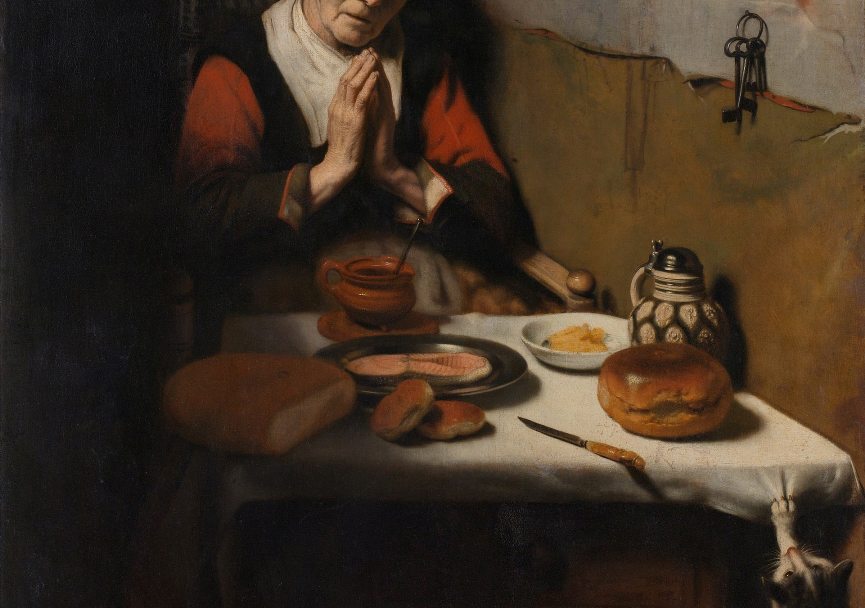Part 3 / Matt. 6:9-13Why do we do what we do? Why do we pray what we pray? Paul Tripp writes that everything we do in life is “done in allegiance to, or pursuit of, either the kingdom of God or the kingdom of self.” At any given moment we are tempted to usurp the throne and seek first our own kingdom. Even our outward acts of service “for God” could inwardly be motivated by personal gain. How do we fight this tendency to prioritize self over our Saviour? One good place to start, is prayer. The kingdom of God and the kingdom of heaven When Jesus instructed his disciples to pray, “Your kingdom come” (v. 10), what did Jesus have in mind? The kingdom features very prominently in Jesus’ teaching. It is first mentioned in Matt. 3:2 when John the Baptist called Israel to repent, “for the kingdom of heaven is at hand.” Jesus preached the same message when he started his public ministry (Matt. 4:17). In fact, in Matt. 4:23 we are told that Jesus “went throughout all Galilee, teaching in their synagogues and proclaiming the gospel of the kingdom”. The gospel, or good news, that Jesus proclaimed had the kingdom as a central theme. We may not make much of the kingdom in our modern gospel preaching, but Jesus clearly did. We also see this in his Sermon on the Mount, of which the Lord’s prayer forms a part. For example, when Jesus describes the blessedness of the “poor in spirit” (Matt. 5:3) or those who are “persecuted for righteousness’ sake” (v. 10), he says: “theirs is the kingdom of heaven”. A few verses later Jesus explains that our reputation in the kingdom of heaven depends on our obedience to his commands (Matt. 5:19: “Therefore whoever relaxes one of the least of these commandments and teaches others to do the same will be called least in the kingdom of heaven, but whoever does them and teaches them will be called great in the kingdom of heaven.”). And entrance into the kingdom of heaven requires a righteousness that “exceeds that of the scribes and Pharisees” (Matt. 5:20). Finally, Jesus reminds his disciples that they should not be anxious about what they will eat, drink, or wear. Our heavenly Father (same phrased used in the opening line of the Lord’s Prayer) will take care of us (Matt. 6:31-32). Instead, we should be focussing on God’s kingdom: “seek first the kingdom of God and his righteousness” (Matt. 6:33). A careful reader would have picked up that these passages sometimes referred to the “kingdom of heaven” or the “kingdom of God”. Is there a difference? There are some who have suggested that there is, but taken in context it is clear that they refer to the same reality. The phrase “kingdom of God” is used throughout the New Testament (68 times, in fact). The phrase “kingdom of heaven” occurs only 32 times and only in the Gospel of Matthew. Some take this to mean that Matthew refers to Christ’s millennial kingdom, while the other New Testament writers refer to God’s universal kingdom. Within Matthew’s gospel, however, the two terms are used interchangeably. In Matthew 19:23 Jesus says: “Truly, I say to you, only with difficulty will a rich person enter the kingdom of heaven.” He then elaborates in the next verse: “Again I tell you, it is easier for a camel to go through the eye of a needle than for a rich person to enter the kingdom of God.” (v. 24). These two verses refer to the same reality. The present and future kingdom The kingdom of God and the kingdom of heaven, therefore, are synonyms for what FF Bruce called “a spiritual sovereignty”. The rule of God is, in one sense, absolute. God is the Sovereign over the entire universe and there are no powers who can rival him. The apostle Paul explains that the power of God, working in the believer, is the same power “that he worked in Christ when he raised him from the dead and seated him at his right hand in the heavenly places, far above all rule and authority and power and dominion, and above every name that is named, not only in this age but also in the one to come. And he put all things under his feet and gave him as head over all things to the church” (Eph. 1:20-22). This has been called God’s providential kingdom or God’s kingdom of power. There is also a sense in which God’s rule is made manifest or visible in the world through the believer. Again, FF Bruce says: “those who believed in Christ there and then entered His Kingdom. The divine rule knew no national bounds; it was received wherever Christ was accepted as Lord and Saviour.” The church and the kingdom are not synonymous, but they are related. The church is the people of the kingdom; as believers we are kingdom citizens. In the words of Col. 1:13: “He has delivered us from the domain of darkness and transferred us to the kingdom of his beloved Son”. This is a present reality for every true believer. It is also true that the current manifestation of the kingdom is not its final one. The kingdom will be fully revealed in the “age to come”. Much of Christ’s teaching focussed on this future realization of the kingdom. For example, in Matt. 25:31 Jesus speaks of the Son of Man coming in his glory to sit upon his glorious throne. Our current citizenship is a foretaste of what will be revealed when Christ establishes his kingdom in glory. Praying for the kingdom When we are instructed to pray, “Your kingdom come,” we aren’t told to pray for a political or earthly kingdom. Jesus made it clear that his kingdom was not of this world. Before Pilate he said: “My kingdom is not of this world. If my kingdom were of this world, my servants would have been fighting, that I might not be delivered over to the Jews. But my kingdom is not from the world.” (John 18:36). We are also not instructed to pray for God’s absolute and sovereign rule. His providential rule cannot be thwarted and is already a present reality. In the words of Thomas Watson: “The kingdom of God’s providence rules over all. Kings do nothing, but what His providence permits and orders. The kingdom of God’s providence we do not pray should come for it is already come.” So, what do we pray for? We pray that God’s kingdom of grace, his spiritual sovereignty over the believer, would be set up in individual lives and increase. This is a prayer for personal piety and a deepening appreciation for the grace that is ours in Christ. It is the recognition that we are “strangers and exiles on the earth” (Heb. 11:13) and that our primary concern in this life is to live as citizens of the next. Speaking of which, we also pray that God’s kingdom of glory would hasten in its coming. We long for the future fulfilment of God’s kingdom and say with the apostle John: “Come, Lord Jesus!” (Rev. 22:20). Conclusion Thomas Watson summarizes this petition of the Lord’s Prayer as follows: “When we pray, ‘Thy kingdom come,’ we are praying that God would help us to know Him better and to love Him more. We are praying that God would give us more strength to resist temptation, to forgive our enemies, and to suffer affliction… We are praying that God would make us different in our callings, that He would establish us in the believe of His truth and in the love of his truth, and that God would grant that our labours would be instrumental in setting up the kingdom in others.” Let us pray, “Your kingdom come.” Part 2 / Matt. 6:9-13What do you want most? What do you desire above all else? When we are asked those questions, we almost instinctively know that there are right and wrong answers. We know that there are things that we are supposed to want, but if we are honest, we would rather have something else. Like a beauty pageant princess, we say that we want world peace, but we would rather have the crown.
Our prayers reveal a lot about our priorities. Jesus said: “For out of the abundance of the heart the mouth speaks.” (Matt. 12:34). Our hearts are idol factories, the chief idol being “self”. Our prayers often reflect a concern for our own interests more than it does a reverence for God. We ask God to serve our idols and then we are surprised when God says, “No!” No, when Jesus taught his disciples how to pray, he showed them where every true prayer starts. Where true prayer starts After addressing his heavenly Father, assuming the proper posture of respect and trust, Jesus prays: “hallowed be your name. Your kingdom come, your will be done, on earth as it is in heaven.” (Matt. 6:9-10). This is not how we usually start our shopping list of prayer requests! What do these requests have in common? Their primary concern is God’s glory, kingdom, and purposes. The prayer that Jesus taught his disciples first focusses on what God wants, before it turns to our needs and wants. This is foreign to our modern minds. We live in a world that constantly tells us that we deserve to have our every need met and our every desire fulfilled. We approach our spiritual lives in much the same way. We look for churches where our felt needs are met. We volunteer only the surplus of our time, talent, or resources. Our prayers sound more like a reading from our Christmas Wishlist than fellowship with our heavenly Father. Something has to change. We need to reprioritize. The apostle John helpfully points out what our priority should be: “And this is the confidence that we have toward him, that if we ask anything according to his will he hears us. And if we know that he hears us in whatever we ask, we know that we have the requests that we have asked of him.” (1 John 5:14-15). One of the reasons why our prayers seem so powerless, is because we do not “ask according to his will”. Maybe we need an armband that says “WWJP”: What Would Jesus Pray. Praying according to the will of God What is God’s will? I have often heard believers say that it is impossible to know the will of God without a voice from heaven or a vision. It is true that God has not revealed everything to his children. Deut. 29:29 does say: “The secret things belong to the LORD our God”). But he has revealed enough; the rest of Deut. 29:29 reads: “but the things that are revealed belong to us and to our children forever, that we may do all the words of this law.” If this were not true, then Paul’s admonition would make no sense: “do not be foolish, but understand what the will of the Lord is.” (Eph. 5:17). God’s will is revealed in the commands, promises, and prayers of God’s Word. For example, 1 Thess. 4:3 tells us “this is the will of God, your sanctification: that you abstain from sexual immorality”. That is pretty clear. How often do we pray for our sanctification and purity? Our problem is not that God has hidden his will, but rather that we have not paid attention to what he has revealed. So let me ask again: What Would Jesus Pray? Hallowed be your name The first request or petition is found in Matt. 6:9: “hallowed be your name”. We do not put much stock in names nowadays. We rarely think about what they mean or represent. Maybe you’ve read about actors naming their children strange things like “Pilot Inspector” or “Moon Unit”. I shudder to think of the playground insults that their kids will have to endure. Biblical names meant something. This does not mean that some of them weren’t strange. Isaiah called one of his sons Maher-shalal-hash-baz after all, but even this strange name meant something: “hasting to the spoil, hurrying to the prey” (Isa. 8:3). This name was chosen to symbolize Assyria’s mad lust for conquest. Even here the name had meaning. Think of how many times the Lord changed someone’s name to signal a significant change in their lives: Abram became Abraham; Sarai became Sarah; Jacob became Israel; Simon was called Cephas or Peter. These new names came to represent a new identity, or if you want to use gospel language, a new person: “he is a new creation” (2 Cor. 5:17). Similarly, God’s name is significant. For example, in Acts 4:12 we are told that “there is salvation in no one else, for there is no other name under heaven given among men by which we must be saved.” Later we are told that the disciples rejoiced that they were counted worthy to suffer dishonour for the name (Acts 5:41). God’s name represents God as he has made himself known. Herman Bavink wrote: “There is an intimate link between God and his name... We do not name God; he names himself… The name is God himself as he reveals himself”. This means that when Jesus instructs his disciples to pray, “hallowed be your name,” he has God’s person, being, character, and work in mind. God’s name, as a revelation of God, is great (Ezek. 36:23), holy (Ezek. 36:20), and awesome (Ps. 111:9). That is why it must be “hallowed”. But what does “hallowed” mean? The word means to regard as holy or set apart. In asking for God’s name to be hallowed, we are asking that God’s name would be set apart from every other name. Wayne Mack explains: “we pray for God to be regarded in a different way from everyone else”. When Nadab and Abihu, the sons of Aaron, offered unauthorized fire before the LORD, fire came out from before the LORD and consumed them. Moses then said to Aaron, "This is what the LORD has said, 'Among those who are near me I will be sanctified, and before all the people I will be glorified.'” (Lev. 10:1-3). God should not be approached or regarded like pagan idols, nor should he be treated as though he were just one of us. That is why God’s name should be hallowed – it is to give God as he has revealed himself respect, honour, and glory. Praying for his name to be hallowed means that we implore God to help us honour him and that other’s would do the same. Conclusion Commenting on the Lord’s prayer, Martin Llyoyd-Jones wrote: “The word hallowed means to sanctify or revere, to make and keep holy. Why does He say, ‘Hallowed be Thy name’? What does this term ‘Thy name’ stand for?... ‘Thy name’, in other words, means all that is true of God, all that has been revealed concerning God. That means that God in all his attributes, God in all that He is, in and of Himself, and God in all that He has done and all that He is doing.” What would Jesus pray? He would pray that his Father would receive the glory that is his due. It is this desire that moved Jesus to pray: “not as I will, but as you will” (Matt. 26:39), in the Garden of Gethsemane. It is this same desire for God’s glory that moved the disciples to pray for boldness even under threat of persecution (Acts 4:29). That is the first thing that Jesus taught his disciples to pray: “hallowed be your name”. Part 1 / Matt. 6:9-13 and Luke 11:1-13
Few biblical prayers have attracted as much attention as the prayer that our Lord Jesus Christ taught his disciples. “The Lord’s prayer” (as it has become known) has also been called the “Pater Noster” (which is Latin for Our Father). The prayer is recorded in Matthew 6 and in Luke 11. There are slight differences between the two and the setting seems to be different as well. This would suggest that Jesus taught this prayer (or a variation of it) to his disciples on several occasions. The setting recorded in Luke 11 is particularly interesting. Luke 11:1 tells us that “Jesus was praying in a certain place, and when he finished, one of his disciples said to him, "Lord, teach us to pray, as John taught his disciples."” The Incarnate Christ prayed… a lot. This was not particularly unique. The Pharisees prayed a lot as well, and they did so in public. Jesus warns against turning prayer into a public spectacle right before he teaches his disciples how to pray in Matthew 6:5. So what was it about Jesus’ prayers that prompted the disciples to ask: “Lord, teach us to pray”? Jesus’ prayers were private moments of intimate communion with his Father. Jesus did pray out loud and in public on the odd occasion (for example, at the tomb of Lazarus in John 11:41-42). Most of his prayers, however, were private. Mark describes Jesus’ normal pattern like this: “And rising very early in the morning, while it was still dark, he departed and went out to a desolate place, and there he prayed.” (Mark 1:35). The disciples, who were close to Jesus, were aware of this. They saw something in Christ’s prayer-life that they did not see with the Pharisees. They heard something in the prayers of Jesus that they had not heard before. And they wanted in… they wanted to pray like that. They wanted fellowship with the Father like Jesus. What did Jesus teach them? Jesus taught them a pattern for prayer. The differences between Matthew and Luke’s versions remind us that this is not some magic spell. There is nothing particularly powerful about reciting it word for word. Crocheting it on a pillow does not make you spiritual. You can pray the Lord’s prayer verbatim, but if you don’t pray with a sincere faith the words are meaningless. If you do not have a relationship with the Father, you have no right to address him as such. Which brings us to the first part of the prayer: “Our Father in heaven” (Matt. 6:9). That is where we will be spending the rest of our time today. Addressing our Father Quick question: was Jesus the first Person to call God Father? Jesus’s assertion that God was his Father first occurred in a debate about the Sabbath. Jesus claimed that it was proper for him to perform healings on the Sabbath because, in his words: “My Father is working until now, and I am working” (John 5:17). In other words, although God rested on the seventh day from his work of creation, his work of preservation and ultimately of redemption was still ongoing. Moreover, Jesus associated his own ministry with that continuing work of the Father, raising the question of their relationship in a way that antagonized his fellow Jews. As the Gospel records: “That was why the Jews were seeking all the more to kill him, because not only was he breaking the Sabbath, but he was even calling God his own Father, making himself equal with God” (John 5:18). Was their reaction justified? The Old Testament seldom uses the word Father as a description of God, but there are a few occasions where it does so. For example, Isa. 63:16-17 reads: “You are our Father, though Abraham does not know us and Israel does not acknowledge us; you, O Lord, are our Father, our Redeemer from old is your name”. And in the next chapter of Isaiah we read: “O Lord, you are our Father; we are the clay and you are our potter; we are all the work of your hand. Be not so terribly angry, O Lord, and remember not iniquity forever” (Isa. 64:8–9). At first it appears that Isaiah was calling God Father because he was Israel’s Creator, but it is not that simple. God is the Creator of every human being, not just of Israel, but he had not established a covenant relationship with everyone. Israel’s connection to God was something special, and different from what could be said about the entire human race. For Isaiah to call God Father was to acknowledge a particular relationship with him. In these verses, God is addressed as Father, not because he is Israel’s Creator, but because he is its Redeemer. You find something similar in Deut. 14:1-2: “You are the sons of the Lord your God … For you are a people holy to the Lord your God, and the Lord has chosen you to be a people for his treasured possession, out of all the peoples who are on the face of the earth.” And again in Psalm 103:13: “As a father shows compassion to his children, so the Lord shows compassion to those who fear him”. God was their Father through redemption. They were brought into this unique relationship with God because of God’s saving work. Israel, as a nation, did call God “Father” on occasion because of his covenant relationship with his OT people, but this was not something that the individual claimed, nor was it the way common Jews addressed God. So, when Jesus taught his disciples to pray, he was instructing them to relate to God in an intimate and personal way. This was new! Relating to God as Father Christians know God as Father. In the words of JI Packer: “If you want to judge how well a person understands Christianity, find out how much he makes of the thought of being God’s child, and having God as his Father. If this is not the thought that prompts and controls his worship and prayers and his whole outlook on life, it means that he does not understand Christianity very well at all… “Father” is the Christian name for God.” We are encouraged to pray to the Father and enabled to do so because, through faith, the Son has united us to him in his death and resurrection (Gal. 2:20). This union with Christ means that God has made us Christ’s “brothers” (Rom. 8:29). Of course, we are not like Jesus in every respect. He is the divine and sinless Son of the Father by nature, whereas we are sinners who have been adopted by grace through faith in him. After his resurrection, Jesus told Mary Magdalene: “Do not cling to me, for I have not yet ascended to the Father; but go to my brothers and say to them, “I am ascending to my Father and your Father, to my God and your God”” (John 20:17). We are not children of God by nature, but we are by grace. To help us understand, experience, and live out this new relationship which is ours in the gospel, God has given his children the Holy Spirit. Paul describes it like this: “Because you are sons, God has sent the Spirit of his Son into our hearts, crying “Abba, Father!” So you are no longer a slave, but a son, and if a son, then an heir through God” (Gal. 4:6–7). Conclusion The opening line of the Lord’s prayer sets the stage for what follows. It frames the whole prayer. For the believer, prayer means approaching your heavenly Father. Jesus explained it like this: “If you then, who are evil, know how to give good gifts to your children, how much more will your Father who is in heaven give good things to those who ask him!” (Matt. 7:11). Even fallible human fathers want to do good to their children; how much more our perfectly good heavenly Father! Question 120 of the Heidelberg Catechism asks: “Why did Christ command us to call God ‘our Father’?” The answer? “To awaken in us at the very beginning of our prayer that childlike reverence for and trust in God, which are to be the ground of our prayer, namely, that God has become our Father through Christ, and will much less deny us what we ask of Him in faith than our parents refuse us earthly things.” This is where true prayer starts: “Our Father in heaven”
Yesterday we saw that the apostle Paul admonished the Ephesian believers to “walk, not as unwise but as wise, making the best use of the time” (Eph. 5:15-16). Time is precious. We have a wonderful illustration of this in antiquity. Kairos was the Greek god “of the fleeting moment”. There was a well-known bronze statue of Kairos by a Greek sculptor named Lysippos. It depicted Kairos with wings on his feet, a bushy lock of hair on his forehead and a bald spot on the back of his head. The epigram on this famous statue explained its meaning: “Who are you? Time and opportunity… why do you have a pair of wings on your feet? I fly with the wind… why does your hair hang over your face? For him who meets me to take me by the forelock… why is the back of your head bald? Because none whom I have once raced by on my winged feet will now… take hold of me from behind.” Some opportunities come by only once in a lifetime; we should, in the words of the apostle Paul, make “the best use of the time”.
This brings us back to Ephesians 5:15-20. How should we redeem the time that we have been given? We have already seen that wisdom will “understand what the will of the Lord is” (v. 17). This calls for time in God’s Word. We have also seen that wisdom will “not get drunk with wine, but be filled with the Spirit, addressing one another in psalms and hymns and spiritual songs, singing and making melody to the Lord with your heart” (v. 18-19). This calls for worship. The final component that Paul points out, is gratitude. Verse 20 explains that a Spirit-filled life will not only worship, but also give “thanks always and for everything to God the Father in the name of the Lord Jesus Christ”. Dr. Paul Hartwig highlights three essential elements of Christian gratitude found in this passage: it is perpetual, universal, and evangelical. Let us look at each of these in turn. Perpetual Verse 20 says that we should be “giving thanks always”. Gratitude should be our constant, consistent, and continuous response to the providence of God. Giving thanks to God should not be an event, but a lifestyle. 1 Thess. 5:18 puts it beautifully: “give thanks in all circumstances; for this is the will of God in Christ Jesus for you.” Universal Verse 20 continues by explaining that such perpetual gratitude is only possible if we understand that God should be thanked “for everything”. Some might object and say that God should be thanked in everything, but not for everything. The text, however, is clear: God should be thanked for everything. Nothing is excluded, good or bad, desirable or undesirable. How can we thank God for everything? Consider this: if God is in control, and if God is good, whatever God ordains will be for our blessing and his glory. Romans 8:28 says: “we know that for those who love God all things work together for good, for those who are called according to his purpose.” This does not mean that I understand all of God’s purposes, nor does it mean that I immediately experience the blessing. Giving thanks for everything means that I trust my sovereign heavenly Father, even when I don’t understand his ways. Evangelical This is what makes our gratitude uniquely Christian: “in the name of our Lord Jesus Christ” (v. 20). The cross of the Lord Jesus Christ, the gospel, gives us the perspective and the basis for such gratitude. It is because we know that God used the tragedy of the cross to bring hope to sinful men, that we can be grateful for everything. God took Jesus to Calvary and he, “for the joy that was set before him endured the cross” (Heb. 12:2). Moreover, we bring our gratitude to God the Father in the “name of our Lord Jesus Christ”. We cannot do this on our own. Our thoughts need to be shaped by the gospel of Jesus Christ. Our prayers need to rest on the grace of Jesus Christ. Our gratitude needs to be empowered by the glory of Jesus Christ. This is how Christians respond in adversity. The apostle Paul instructed the believers in Ephesus to do this while he was imprisoned in Rome. He wasn’t a fair-weather Christian, but a believer who knew how to walk in wisdom, making the best use of the time, worshiping and thanking God in the power of the Spirit and in the Name of the Lord Jesus Christ. What will you do with this opportunity? Because of Christ, Pastor Pieter When the president announced a 21 day national lockdown starting on the 26th of March 2020, many people panicked. Stores were swarmed with anxious buyers and travellers hurried to get home as the country prepared to effectively shut down. Immediately people began counting the days, myself included. The initial lockdown would have ended on Friday, the 17th of April 2020, but on the eve of Good Friday the president announced that the lockdown would be extended to the end of April.
How should Christians respond? I’d like to take you to Ephesians 5:15-20. For the next two days we’ll look at this passage together. It won’t answer all our questions, but it will help us make wise decisions and to respond in a God-honouring way. “Look carefully then how you walk, not as unwise but as wise, making the best use of the time, because the days are evil. Therefore do not be foolish, but understand what the will of the Lord is. And do not get drunk with wine, for that is debauchery, but be filled with the Spirit, addressing one another in psalms and hymns and spiritual songs, singing and making melody to the Lord with all your heart, giving thanks always and for everything to God the Father in the name of our Lord Jesus Christ”. The apostle Paul began Ephesians 5 with a simple, but profound call: “be imitators of God” (v. 1). How could we possibly imitate God? In most respects we can’t, but Paul does mention three things in this chapter that we can imitate. The first is love – God’s love being made visible in the Lord Jesus Christ (v. 1-7). The second is holiness – God’s holiness being made visible in a life of light (v. 8-14). The third is wisdom. Verse 15 says: “Look carefully then how you walk, not as unwise but as wise”. Wisdom, God’s wisdom, is not something that comes naturally to man, because we are born separated from God and our hearts are naturally inclined against him (Eph. 2:3). We are born fools. In chapter 4:17-18 Paul describes the unconverted as walking in “the futility of their minds” and says that they are “darkened in their understanding, alienated from the life of God”. Outside of God’s redeeming grace in Jesus Christ humanity is foolish. So where do we get the wisdom we so desperately need? Wisdom is found in the Lord, who is himself the Author of wisdom. To gain such wisdom, and to grow in it, we must fear the Lord (Proverbs 9:10), study his Word (Psalm 119:99) and pray (James 1:5). And we now have the time to do it. Note what Paul says in verse 16: “making the best use of the time, because the days are evil.” Wisdom understands that time is precious and that we only have a finite amount of it. In Psalm 90:12 Moses prays: “So teach us to number our days that we may get a heart of wisdom.” Let’s do that. We have 168 hours in our seven-day week. Roughly a third of those 168 hours should be devoted to rest and sleep – around 8 hours a day. That leaves us with 112 hours. With many of us either working from home or not working at all, balancing those 112 hours becomes very difficult. By now many of us may have run out of projects that needed to be done around the house. You can only Spring clean your house so many times. What should we do with the remaining hours? If we are to be imitators of God (v. 1) and if we should “walk… as wise” (v. 15), our priorities will be shaped by the Lord and his Word. Verse 17 says: “Therefore do not be foolish, but understand what the will of the Lord is.” To know what the will of the Lord is, we need to spend time in the Word. One of the complaints I hear often is that people don’t have the time to really study God’s Word. They squeeze it in here and there, but they don’t have time to really read and meditate through God’s Word. But we do now. Another priority that you’ll pick up is worship. Verse 18-19 contrasts the drunken revelry of the world with the Spirit-filled worship of the church: “addressing one another in psalms, hymns and spiritual songs, singing and making melody to the Lord with your heart”. When we spend time in God’s Word, where God speaks to us, it moves us to respond. When the Word convicts us of sin, we respond with prayerful contrition and repentance. When the Word reveals the glories of God, we respond with praise and adoration. The Psalms are a wonderful refuge in this time, as are those songs and hymns that have stood the test of time. Let them be the “background music” of your lockdown. Tomorrow we’ll look at the last part of this passage. For now, remember to “walk, not as unwise but as wise, making the best use of the time”. Because of Christ, Pastor Pieter What is wisdom? Believers often struggle to define wisdom, because to many the concept of wisdom seems abstract and mysterious. Biblical wisdom, however, is concrete and practical. It is the ability to make godly choices in life. Wisdom is not something you are born with, but something that you should pursue, attain and develop throughout your life.
Where do we get wisdom? The world has its own ideas of where to find wisdom. James warns us against wisdom “from below” (James 3:15). This is worldly wisdom and is “earthly, unspiritual, demonic”. It is motivated by “jealousy and selfish ambition” and leads to “disorder and every file practice” (v. 16). True wisdom cannot be found “below”. True wisdom comes “from above” (v. 17), because God is the source of wisdom. Wisdom is an attribute of God. As Daniel explained to Nebuchadnezzar: “Blessed be the name of God forever and ever, to whom belong wisdom and might. He changes times and seasons; he removes kings and sets up kings; he gives wisdom to the wise and knowledge to those who have understanding; he reveals deep and hidden things; he knows what is in the darkness, and the light dwells with him.” (Dan. 2:20-22). In his distress Job had to acknowledge: “With God are wisdom and might; he has counsel and understanding.” (Job 12:13). What is the difference between God’s knowledge and God’s wisdom? When God’s knowledge is applied and governed by God’s character, that is called wisdom. God’s wisdom is practical. JI Packer explains it this way: “God’s wisdom is seen in His works of creation, preservation and redemption”. Let’s unpack that for a moment. Packer explains that God’s wisdom is first seen in “His choice of His own glory as His goal”. This is wise, because there is no greater goal than the glory of God. If God were to serve any lesser goal, he would not be wise. Psalm 46:10: “Be still, and know that I am God. I will be exalted among the nations, I will be exalted in the earth!”. Second, God’s wisdom is seen in His decision to achieve his goal “by creating a marvellous variety of things and people”. Creation is a testament to God’s wisdom. Ps. 104:24 says: “O LORD, how manifold are your works! In wisdom have you made them all; the earth is full of your creatures.” Third, God’s wisdom is seen in “kindly providences of all sorts”. The way in which God guides, governs and cares for creation displays his wisdom. Paul, preaching in Lystra, said: “[God] did not leave himself without witness, for he did good by giving you rains from heaven and fruitful seasons, satisfying your hearts with food and gladness.” (Acts 14:17). And finally God’s wisdom is seen in “the redemptive ‘wisdom’ of ‘Christ crucified’”. The gospel proves the wisdom of God and humbles the so-called wisdom of man. In the words of 1 Cor. 1:23-25: “we preach Christ crucified, a stumbling block to Jews and folly to Gentiles, but to those who are called, both Jews and Greeks, Christ the power of God and the wisdom of God. For the foolishness of God is wiser than men, and the weakness of God is stronger than men.” Even the church, which is born from the gospel, displays God’s wisdom: “so that through the church the manifold wisdom of God might now be made known to the rulers and authorities in the heavenly places.” (Eph. 3:10). Let’s make it personal. How should we respond to the wisdom of God? You can start by submitting to it. Charles Spurgeon said: “Our Creator is infinitely good, and his will is love: to submit to one who is ‘to wise to err, too good to be unkind,’ should not be hard.” You should also pursue wisdom. We need wisdom to live lives that please the Lord. Even so, we need to be careful where we go looking for that wisdom; as we’ve seen, wisdom from below leads to disaster. We need to pursue wisdom “from above”. How do we do that? First, fear the Lord. Proverbs 1:7 says: “The fear of the LORD is the beginning of knowledge”. Second, receive God’s Word. Psalm 119:98 says: “I have more understanding than all my teachers, for your testimonies are my meditation.” And third, pray for wisdom. James 1:5 encourages us: “If any of you lacks wisdom, let him ask God, who gives generously to all without reproach, and it will be given him.” God is perfectly wise and worthy of our trust and obedience. Because of Christ, Pastor Pieter One of the lessons that the lock down has taught us, is that we are not as independent as we would like to believe. We need each other. This was evident right from the beginning: “It is not good that the man should be alone” (Genesis 2:18). There are numerous “one another” commands in the New Testament. These all imply relationships within the body of Christ. Even believers need one another. Above all we need God, because in “him we live and move and have our being” (Acts 17:28).
God, however, is different. God does not need anyone. He is completely self-sufficient. This is sometimes called the aseity of God. The word aseity means “from oneself.” As RC Sproul explained: “God has the power of being in and of Himself. He does not derive it from something else. God is not dependent on anything outside of Himself. God has never needed us to survive or to be, but we His creatures are totally dependent.” When God revealed himself to Job, God said: “Who has first given to me, that I should repay him? Whatever is under the whole heaven is mine.” (Job 41:11). Psalm 50:10-12 says something similar: “For every beast of the forest is mine, the cattle on a thousand hills. I know all the birds of the hills, and all that moves in the field is mine. ‘If I were hungry, I would not tell you, for the world and its fullness are mine.’” The apostle Paul also preached God’s independence to the Athenians: “The God who made the world and everything in it, being Lord of heaven and earth, does not live in temples made by man, nor is he served by human hands, as though he needed anything, since he himself gives to all mankind life and breath and everything.” (Acts 17:24-25). Even the name that God chose for himself, “I AM”, implies that God is uniquely independent and self-sufficient (Ex. 3:14). Wayne Grudem helpfully points out: “God’s existence and character are determined by himself alone and are not dependent on anyone or anything else.” If God doesn’t need anything, why did he make man? Some believers assume it was because God was lonely, but the Bible contradicts this false assumption. God isn’t lonely, because God has existed in Trinity for all eternity. That means that within the Trinity of Father, Son and Holy Spirit God has perfect fellowship, glory and love. Jesus prayed, in John 17:5: “And now, Father, glorify me in your own presence with the glory that I had with you before the world existed.” Earlier, in John 14:31 we read that Jesus not only shares in the Father’s glory, but in his love: “I do as the Father has commanded me, so that the world may know that I love the Father”. Perfect glory, love and fellowship – God does not need anything or anyone outside of himself. What does this teach us? First, it reminds us that we are dependent beings. Revelation 4:11: “Worthy are you, our Lord and God, to receive glory and honour and power, for you created all things, and by your will they existed and were created.” We need God and our feeble attempts to live without him are not only delusional, but insulting. We are alive because of the gracious will of God. Acting as though we don’t need God is naïve and foolish. We need to cultivate the kind of attitude that Paul had: “I can do all things…” Don’t stop there, “through him who strengthens me” (Phil. 4:13). We need to learn to depend on God. Second, God’s independence teaches us that our worship and adoration does not meet God’s need, it recognizes his sufficiency. Allow me to explain. If we understand that God doesn’t need us, we might be tempted to think that we don’t matter. We might wonder whether our worship and service are significant. They are, not because God needs us, but rather because God has created us and determined that we would be meaningful to him. That is what makes us significant: that God wills it so. God has chosen to create us for his glory (Isa. 43:7) and God has decided to delight in what he has made. In the words of Isaiah 62:5: “as the bridegroom rejoices over the bride, so shall your God rejoice over you.” That is where we find our significance: recognizing that even though God does not need us, he delights in us with a perfectly free, sovereign, and independent love. God doesn’t need us, but he delights in those who delight in him. Because of Christ, Pastor Pieter We’ve been inundated with fake news. With new government regulations threatening fines and even imprisonment for those who spread false or misleading news stories, questions of truth have again taken centre stage. Like Pilate in John 18:38 we find ourselves asking: “What is truth?”
The Bible answers emphatically: “God is truth.” Jer. 10:10-11 declares: “the LORD is the true God; he is the living God and the everlasting King…. The gods who did not make the heavens and the earth shall perish”. John Gill explains: “Whatever is said of human beings, God is truth itself… God is true, real, and substantial, the living God in opposition to fictitious deities.” When we say that God is truth, we first acknowledge that God is the true God. As we just heard from the prophet Jeremiah, God is the living God and all other deities are mere figments of our imagination. When Jesus prayed to his Father he said: “this is eternal life, that they know you the only true God, and Jesus Christ whom you have sent.” (John 17:3). Because God is true, God’s knowledge is also true. Louis Berkhof says that God “knows things as they really are”. God’s knowledge, therefore, is not only true, but the final standard of truth. God is “perfect in knowledge” (Job 37:16). This means that God is never wrong, never mistaken, never confused or perplexed. God has the correct understanding of the nature of reality. Our knowledge is only true insofar as it conforms to God’s. Finally, because God is true his words are also true. This means that God is reliable and faithful in all that he says. He is a “God of faithfulness” (Deut. 32:4). God will always do what he has said and will always keep his promises. Numbers 23:19 says: “God is not man, that he should lie, or a son of man, that he should change his mind. Has he said, and will he not do it? Or has he spoken, and will he not fulfill it?” The Scriptures are God’s truth revealed to man. As Jesus said in John 17:17: “your word is truth.” Because God can be trusted, his Word can be trusted as well. Proverbs 30:5 assures us: “Every word of God proves true.” God “never lies” (Titus 1:2). How does this apply to us? Knowing God is true and faithful encourages us to trust him. His Word becomes a solid foundation for our understanding of ourselves, the world and our place in it. It tells us who we truly are, who God truly is and how we can have a relationship with him. It is filled with precious promises that are as true and dependable as God is. In the words of Psalm 37:3: “Trust in the LORD, and do good; dwell in the land and befriend faithfulness.” The second part of that verse also tells us that we should strive to be trustworthy and faithful. If God is the God of truth, as his children we should be people of truth. Those who have been born again through faith in the Lord Jesus Christ should not lie. Col. 3:9: “Do not lie to one another, seeing that you have put off the old self with its practices”. We should love truth and despise falsehood. In the words of Zech. 8:17: “do not devise evil in your hearts against one another, and love no false oath, for all these things I hate, declares the LORD.” God is true and faithful. His Word can be trusted, because He is trustworthy. And if our God is trustworthy, we should be as well. Because of Christ, Pastor Pieter When was the last time you sang a hymn about God’s justice? It is not a theme that we talk about, much less sing about, but the Psalms often celebrate God’s justice. Psalm 103:6: “The LORD works righteousness and justice for all who are oppressed.” Psalm 129:4: “The LORD is righteous; he has cut the cords of the wicked.” Righteousness is an attribute of God which is celebrated in the Psalms.
What is righteousness? Righteousness can refer to someone who is acquitted in a trial (Deut. 25:1 speaks of acquitting the innocent and punishing the guilty). It can also refer to someone who, outside of the court setting, is in step with the law. Psalm 15:2 describes such a person as “He who walks blamelessly and does what is right and speaks truth in his heart”. To truly understand righteousness, however, we should not look to man, but to God. Righteousness is first and foremost an attribute of God. As Wayne Grudem explains, righteousness means that God “always acts in accordance with what is right and is himself the final standard of what is right”. Louis Berkhof defined it like this: “It is that perfection of God by which He maintains Himself over against every violation of His holiness, and shows in every respect that He is the Holy One.” God’s righteousness is manifested in different ways. First, we see God’s justice manifested in his righteous rule. In Isa. 33:22 the prophet assures God’s people: “the LORD is our judge; the LORD is our lawgiver; the LORD is our king; he will save us.” God’s righteousness is revealed in the way that God governs the world, imposing a law that promises blessing for the obedient and threatens punishment for the wicked. Second, God’s justice is manifested in his gracious rewards. We don’t think often think about rewards when we consider God’s justice, but God promises: “Know therefore that the LORD your God is God, the faithful God who keeps covenant and steadfast love with those who love him and keep his commandments, to a thousand generations” (Deut. 7:9). Psalm 58:11 rejoices: "Surely there is a reward for the righteous; surely there is a God who judges on earth.” In this way God’s justice is also an expression of his love. Interestingly, this aspect of God’s justice is more prominent in Scripture than his retribution. It does not mean, however, that retribution is absent. Third, God’s justice is manifested in just retribution. Romans 2:4 warns: “There will be tribulation and distress for every human being who does evil”. Romans 12:19 adds: “Beloved, never avenge yourselves, but leave it to the wrath of God, for it is written, "Vengeance is mine, I will repay, says the Lord."” Taken together we see that God will always act in accordance with his holiness. God is righteous. How does this apply to us? If we take God’s moral perfection as the standard for true righteousness, we must confess that we simply don’t measure up. Romans 3:23 gives us the unvarnished truth: “all have sinned and fall short of the glory of God”. This means that we stand condemned before the righteous God and that we deserve punishment: “For the wages of sin is death” (Rom. 6:23). How can we escape the righteous wrath of God for our sins? Mercifully Romans 3 does not end with verse 23. It continues: “and are justified by his grace as a gift, through the redemption that is in Christ Jesus, whom God put forward as a propitiation by his blood, to be received by faith.” (Romans 3:24-25). This means that we can be declared righteous through faith in Jesus Christ. How is that possible? By faith Jesus Christ has taken upon himself the righteous wrath of God for our sins and died for our sins on the cross. He died the death we deserved to die. By faith Jesus Christ’s righteousness is imputed to us: his righteousness becomes ours. In the words of 2 Cor. 5:21: “For our sake he made him to be sin who knew no sin, so that in him we might become the righteousness of God.” This is how unrighteous sinners are reconciled to a righteous God: through Jesus Christ the righteous (1 John 2:1). Embrace Christ, celebrate God’s righteousness and trust in God’s enabling power to live a righteous life. Zeph. 3:5: “The LORD… is righteous; he does no injustice; every morning he shows forth his justice; each dawn he does not fail”. Because of Christ, Pastor Pieter You’ve read Psalm 34:8: “Oh, taste and see that the LORD is good!” You’ve sung “God is good, all the time.” But what does it mean? What does the Bible mean when it says that God is good? God’s goodness means that God is the final standard of good. It also means that everything that God is and does is worthy of approval. AW Pink writes: “God…is the highest good. God is not only the Greatest of all beings, but the Best.” This means that God becomes the standard by which good is measured.
What does goodness look like? Psalm 103:8 gives us four expressions of God’s goodness – four ways in which God’s goodness is expressed towards his children: “The LORD is merciful and gracious, slow to anger and abounding in steadfast love.” We’ve already looked at God’s love, so let’s explore his mercy, grace and patience. What is mercy? The great Princeton theologian, Charles Hodges, explains it this way: “Goodness … includes benevolence, love, mercy, and grace. Mercy is kindness exercised towards the miserable and includes pity, compassion, forbearance, and gentleness.” Mercy is God’s goodness towards those in distress and difficulty. David often cried out to the Lord for mercy. In 2 Sam. 24:14 David told the prophet Gad: “I am in great distress. Let us fall into the hand of the LORD, for his mercy is great”. David was not the only one to call upon the mercy of God. In Matt. 9:27 two blind men called out to Jesus: “Have mercy on us, Son of David.” Mercy means that God is good to those in distress. He invites us to pray for mercy. Heb. 4:16: “Let us then with confidence draw near to the throne of grace, that we may receive mercy and find grace to help in time of need.” God will not forget his children in trial and difficulty. Nor should his children forget others. If we have been the recipients of mercy, we should also be givers of mercy: “Blessed are the merciful, for they shall receive mercy.” (Matt. 5:7). Back to Psalm 103:8: “The Lord is merciful and gracious...” What is grace? Again, Charles Hodge offers a helpful definition: “Grace is love exercised towards the unworthy.” Grace is God’s goodness toward those who do not deserve it. It is unmerited favour. When God revealed himself to Moses He declared: “I will be gracious to whom I will be gracious, and will show mercy on whom I will show mercy.” (Ex. 33:19). The apostle Peter would later call God “the God of all grace” (1 Pet. 5:10). Salvation through Jesus Christ is all of grace – it is motivated by God’s goodness towards the unworthy. Rom. 3:23-24 explains: “all have sinned and fall short of the glory of God, and are justified by his grace as a gift, through the redemption that is in Christ Jesus”. Grace means that God is good to repentant sinners. The irony is that we often think we can earn grace. If we earned it, it would cease to be grace (Rom. 11:6). It is not the persistence of your prayers, your commitment to Bible reading or your zeal for evangelism that saves you. These are great things and you should be doing them, but you are not saved by them. You are saved by grace, which means that you and I must admit or confess that we don’t deserve God’s goodness. Similarly, if you’ve received grace, you’ll give grace as well. Eph. 4:32: “Be kind to one another, tender-hearted, forgiving one another, as God in Christ forgave you.” Psalm 103:8 continues: “The LORD is merciful and gracious, slow to anger...” What does “slow to anger” mean? Wayne Grudem defines God’s patience as God’s goodness in withholding punishment toward those who sin over a period of time. In Rom. 2:4 the apostle Paul calls it “the riches of his kindness and forbearance and patience”. God’s patience means that God gives the sinner an opportunity to repent. God displayed his longsuffering goodness towards Paul: “But I received mercy for this reason, that in me, as the foremost, Jesus Christ might display his perfect patience as an example to those who were to believe in him for eternal life.” (1 Tim. 1:16). The patience of God does not mean that God simply ignores sin or that God approves of it. Quite the opposite: God knows our sin and it offends his holiness, yet he withholds judgment for a time, giving the sinner an opportunity to repent. His patience should not be used as an excuse for sin, but as motivation to repent. Also, as God is patient with us, we are called to be patient with others. James 1:19 instructs us to be “quick to hear, slow to speak, slow to anger”. God’s goodness means that God is the very definition of good. That goodness is made visible in his mercy, grace, patience and love. God is good, all the time. Because of Christ, Pastor Pieter Does God really love me? This is just one of the questions we wrestle with when we go through trials and calamity. Psalm 107 opens with these encouraging words: “Oh give thanks to the LORD, for he is good, for his steadfast love endures forever!” (v. 1). We’ve heard those words before; we may even have sung them on occasion. But how do we know that they are true?
Sometimes the words, “God loves you”, just don’t seem to make sense. They seem so out of place in our trials, or when we feel the weight of our sin. Our trials lie to us: ‘God doesn’t love you;’ our sins whisper: ‘God can’t love you’. Does God really love me? Turning back to Psalm 107 for a moment, we see that the Psalmist reviews God’s acts of love in the past. This gives him confidence for the future. Let’s look at the Psalm for a moment. It will be much easier for you to follow along if you have your Bible open in front of you. Feel free to pause the podcast while you fetch your Bibles. Ready? Let’s dive in… He opens with the reminder that “the redeemed of the Lord” should praise God (v. 2-3). Then he reviews God’s love and mercy to four different groups of people. Each new section opens with “some” (v. 4, 10, 17, 23). In each of these sections he describes the circumstances from which God delivered them and then tells them how to respond: “Let them thank the LORD for his steadfast love, for his wondrous works to the children of men!” (v. 8, 15, 21, 31). The first group (v. 4-9) are those who wandered in barren places. Chances are these were Israelites in exile, with no place to call their home. But God delivered them and satisfied their longing souls (v. 9). The second group (v. 10-16) are those who sat in darkness. They had rebelled against God and received the just penalty for their sin, yet God was merciful to them. We are told that God “brought them out of darkness and the shadow of death” (v. 14). The third group (v. 17-22) are those who suffered for their own folly. They were fools through their sinful ways, and suffering for it. Still God was merciful, and he healed them (v. 20). The fourth group (v. 23-32) are those who went down to the sea in ships. We aren’t certain if they were exiles, merchants or slaves (the Israelites rarely went to sea on their own), but soon disaster overtook them. Winds and waves tormented them, and they were at their wits’ end (v. 27). God delivered them and quieted the storm. The last section reflects on how the Lord brings about a reversal of fortunes and delivers his people (v. 33-42). Why would the Lord do that? The final verse tells us: “Whoever is wise, let him attend to these things; let them consider the steadfast love of the LORD.” (v. 43). God brings about the deliverance of his people because of his great love. Love moves God to lead his people home, to forgive sinners, to restore the foolish and to save those afflicted by nature’s fury. God does these things because God of his steadfast love. There is one other thing I want to point out in Psalm 107. Maybe you’ve noticed it already. What did God’s people do in their affliction that opened the floodgates of God’s love and mercy? Verse 6: “Then they cried to the Lord in their trouble and he delivered them from their distress.” You see the same thing in verse 13, 19 and 28. How does this apply to us? God’s love is not limited to the worthy – in fact, the only worthy recipient of God’s love is God himself. No, God’s love is extended to the lost, the sinner, the fool and the sufferer if they will but cry out to him. “whoever would draw near to God must believe that he exists and that he rewards those who seek him” (Heb. 11:6). This means that we will only cry out to God if we believe that he wants to help – if we have confidence in his love. That is why it is so important to consider the steadfast love of the Lord” (Ps. 107:43). So, take the time to consider, to meditate on, to think about the love of God. There is no better place to begin your study of his love than the cross of Jesus Christ: “For God so loved the world, that he gave his only Son” (John 3:16). Let that fuel your prayers, shape your thoughts and calm your fears. Because of Christ, Pastor Pieter Isaiah 6 opens with one of the most amazing vision of God in all of Scripture. Verse 1 begins: “In the year that King Uzziah died”. Uzziah wasn’t Judah’s best king, but he also wasn’t their worst. Judah experienced relative peace and prosperity during his reign. Isaiah’s mind, however, wasn’t dwelling on the death of the king in that moment – he had bigger things to worry about.
Verse 1 continues: “I saw the Lord sitting upon a throne, high and lifted up; and the train of his robe filled the temple.” What did Isaiah see? The majesty of God. Seated upon his throne God completely displaced any thought Isaiah had of Uzziah or the nation of Judah – here, in the throne room of heaven they were small by comparison. He saw the throne, which speaks of God’s authority. He saw the train of his robe, which displays his majesty. But most important of all, Isaiah heard... What did he hear? The seraphim (six winged angels who served in God’s direct presence) proclaimed the praises of the One seated on the throne: “Holy, holy, holy is the LORD of hosts; the whole earth is full of his glory!” (v. 2-3). Such was their cry that the doorposts shook, and the room was filled with smoke (v. 4) – this was not just another Sunday worship service. In that moment Isaiah met “the Holy One of Israel” (his favourite title for God in the rest of the book). What is holiness? Thomas Trevethan explains it this way: “Holy apparently comes from a Semitic root that means ‘to cut.’ Hence its most basic meaning is ‘to separate’ or ‘to make distinct’... most fundamentally, as a divine attribute it claims that God is other and set apart from everything else, that He is in a class by Himself.” God is infinitely greater than his creatures. We can see this in two ways. First, he is the only truly self-sufficient Being. All His creatures depend on Him, but God depends on no-one outside of himself. Second, God is distinct, set apart from all evil. God is absolute in purity and perfection. He is the definition of what it means to be good. Ultimately, we must confess that human language cannot capture the idea adequately. RC Sproul, in his book The Holiness of God, writes: “The problem we face is that the word holy is foreign to all languages. No dictionary is adequate to the task.” German theologian and philosopher Rudolf Otto tried to define holiness by studying the concept in different cultures and languages. His study revealed that, universally, there was an element of holiness that no language could capture. There is something about the holiness of God that we simply could not express. He called it “a Mystery inexpressible and above all creatures”. For Otto the only appropriate response would be “hushed, trembling, and speechless humility”. How did Isaiah respond to God’s holiness? In verse 5 he cried out: “Woe is me! For I am lost”. It is only in the light of God’s holiness that we can see ourselves for who we truly are. One of the reasons we do not see our own sin, is because we are surrounded by so much of it. We do what the false teachers in Corinth did: “when they measure themselves by one another and compare themselves with one another, they are without understanding.” (2 Cor. 10:12). We will always find someone who looks more evil or sinful than we are. But in God’s presence such comparisons don’t matter. All that matters is how we compare to God – the supreme standard of holiness. He then confessed his sin: “am a man of unclean lips” (Isaiah 6:5). For us this might seem like a minor sin, a respectable sin, maybe even an excusable sin. Who hasn’t sinned with their lips? We are only human, after all. But in the light of God’s holiness even our smallest sins are seen for what they are: cosmic treason against the God of the universe; an act of rebellion against the Lord seated upon the throne. How can we stand before such a holy God? The same way Isaiah could. Read the rest of the passage: “Then one of the seraphim flew to me, having in his hand a burning coal that he had taken with tongs from the altar. And he touched my mouth and said: "Behold, this has touched your lips; your guilt is taken away, and your sin atoned for.” (v. 6-7). The only way sinners can stand before the holy God is through sacrifice – that is what the altar represents. And we have that sacrifice in Jesus Christ: “he entered once for all into the holy places, not by means of the blood of goats and calves but by means of his own blood, thus securing an eternal redemption.” (Hebrews 9:12). That is how a sinner can be reconciled to the Holy God – not by our attempts to earn God’s favour, but by faith in Christ’s sacrifice for our sins on our behalf. Because of Christ, Pastor Pieter There is something about the raw energy of nature that just inspires awe. Crashing waves, peals of thunder, howling winds – these all demonstrate the raw power of creation. But as powerful as these elements of nature are, they are nothing compared to the sun. The Sun releases energy at the rate of a mass–energy conversion rate of 4.26 million metric tons per second, which produces the equivalent of 38,460 septillion watts (3.846×1026 W) per second. To put that in perspective, this is the equivalent of about 9.192×1010 megatons of TNT per second, or 1,820,000,000 Tsar Bombas – the most powerful thermonuclear bomb ever built! Now think about this for a moment: God spoke the sun into being.
God is powerful and his power is beyond human comprehension. Blaise Pascal said: “The greatest single distinguishing feature of the omnipotence of God is that our imagination gets lost thinking about it.” God is all-powerful or omnipotent. That means that God has the power or the ability to do whatever pleases him. Deut. 10:17 described God as “God of gods and Lord of lords, the great, the mighty, and the awesome God”. There is no-one like God. Just listen to how the Bible describes God:
Even after reading all these verses, and there are many more, we’ve only begun to scratch the surface of God’s power. As Paul explains in Ephesians 3:20: “Now to him who is able to do far more abundantly than all that we ask or think, according to the power at work within us”. No wonder then that one of the Bible’s favorite titles for God is “the Almighty” (2 Cor. 6:18 and Rev. 1:8). At this point you might be wondering if there is anything that God cannot do? For example, some philosophers have wondered whether God can create a rock that he cannot lift, or if God can draw a square circle. These are absurd and illogical questions. I believe CS Lewis summed it up best when he wrote: “His Omnipotence means power to do all that is intrinsically possible, not to do the intrinsically impossible. You may attribute miracles to Him, but not nonsense.” So is there anything that God cannot do? God cannot go against his nature, his character. If God is truth (Isaiah 65:16), it follows that God cannot lie (Titus 1:2: “God, who never lies”). God can also not be tempted to sin. James 1:13: “God cannot be tempted with evil”. In other words, God’s power is only limited by his character – he will never do anything that contradicts his holy, gracious, righteous and loving character. Why is this important? One of the most frightening things in life is when power is wielded by evil men. The gun in the hand of a criminal or an army in the hand of a tyrant – these are frightening. But God is not like that. God’s power is governed by God’s character and God is supremely, perfectly good. Therefore his children need never fear his power, they need only rely on it. You see the power and the perfect character of God meet at the cross. In Matt. 19 we meet a rich young ruler. He ran up to Jesus and asked Jesus what he must do to be saved. Jesus took in to the law, not because he could by saved by obeying the law, but because the law would expose his inability to save himself. The young man could not see his own need, so Jesus pressed him: “sell what you posses and give to the poor” (v. 21). He went away sorrowful, because he had many possessions. Jesus then said something that alarmed the disciples: “it is easier for a camel to go through the eye of a needle than for a rich person to enter the kingdom of God.” (v. 24). Jesus’ point was that it is impossible for a sinner to save himself, and the disciples understood. “Who then can be saved?”, they asked. Here is our assurance: “With man this is impossible, but with God all things are possible.” (v. 26). God is omnipotent – all-powerful. All things are possible with him, even the salvation of sinners like us. Let us trust in the God who can. Because of Christ, Pastor Pieter Isaiah 66:1 says that heaven is God’s throne, but that does not mean that God is contained there. Thomas Brooks wrote: “Though heaven be God’s palace, yet it is not his prison.” God is everywhere. We call this attribute God’s “omnipresence”.
What is omnipresence? Omnipresence is often misunderstood or misrepresented. People often fall into one of three traps. The first is pantheism, which believes that God is everything and that everything is God. Budism, Hinduism and “mother nature” cults all hold to some form of pantheism. According to the Bible, however, God is unique and distinct from his creation. The second trap is panentheism. This is more subtle. Panentheism doesn’t believe that everything is God or that God is everything, but that God is in everything and that everything is in God. Some theologians believe that this is what Paul had in mind when he said: “In him we live and move and have our being” (Acts 17:28). The problem with panentheism is that God and creation are seen as “interdependent”. As the philosopher Alfred Whitehead said: “It is as true to say that God creates the world as that the world creates God.” In panentheism God could not exist apart from creation. In subtle ways it denies that God is truly distinct from his creation and it denies that God made the world out of nothing. According to the Bible, however, God does not need the world; we need God. The third trap is deism. Deism views God as so transcendent, so exalted, and so distinct from his creation that he is not actively involved in it. Deists believe that God created the world, but that God then withdrew from it. Deism pictures God as a divine clockmaker, who assembles the clock, winds it up, but then leaves it alone as it winds down. This view denies any form of divine intervention, does not believe in the power of prayer or miracles. God is completely aloof from creation. Is that how the Bible portrays God? It is true that God is transcendent. Psalm 113:4-6 proclaims: “The LORD is high above all nations, and his glory above the heavens! Who is like the LORD our God, who is seated on high, who looks far down on the heavens and the earth?” God is transcendent. But it is equally true that God is immanent, involved, near. Omnipresence means that God is everywhere all the time. God does not have size or dimensions, which means that he can be present at every point of space with his whole being. Psalm 139:7-10 reveals a God who is near: “Where shall I go from your Spirit? Or where shall I flee from your presence? If I ascend to heaven, you are there! If I make my bed in Sheol, you are there! If I take the wings of the morning and dwell in the uttermost parts of the sea, even there your hand shall lead me, and your right hand shall hold me.” For this Psalmist this was a great comfort, because there was nowhere he could go where God could not keep him. In Jer. 23:23-24 the Lord says: “Do I not fill heaven and earth?” God is everywhere. How does this truth affect us? It should encourage us as we pray. In 1 Kings 18 Elijah challenged the prophets of Baal to a praying contest: they each had to call upon their god and the one who answered with fire would be declared the winner. The prophets of Baal spent most of the morning and the early afternoon calling out to Baal, but there was no answer. Elijah mocked them, saying: “Cry aloud, for he is a god. Either he is musing, or he is relieving himself, or he is on a journey, or perhaps he is asleep and must be awakened.” (v. 27). Maybe Baal was out of town. But when Elijah prayed, he did not pray to a God who was aloof, far away or uninterested. He prayed to the God who is near: “O LORD, God of Abraham, Isaac, and Israel, let it be known this day that you are God in Israel, and that I am your servant, and that I have done all these things at your word. Answer me, O LORD, answer me, that this people may know that you, O LORD, are God, and that you have turned their hearts back.” (v. 36-37). God answered with consuming fire. God is close enough to hear us pray. God’s omnipresence should also encourage us as we wrestle with sin. Yes, the thought that God is there when we commit our most heinous sins is frightening, as it should be. God knows our sinful thoughts, words and deeds. Psalm 139:11-12: “If I say, "Surely the darkness shall cover me, and the light about me be night," even the darkness is not dark to you; the night is bright as the day, for darkness is as light with you.” How should we respond to God’s omnipresence when we’ve sinned? By running to him, not from him. It would be pointless to try and hide form God, like Adam and Eve did. We should rather confess and repent, “For thus says the One who is high and lifted up, who inhabits eternity, whose name is Holy: "I dwell in the high and holy place, and also with him who is of a contrite and lowly spirit, to revive the spirit of the lowly, and to revive the heart of the contrite.” (Isa. 57:15). God is near repentant sinners. Finally, God’s omnipresence should encourage us as we go through trials. Before his ascension Jesus assured his disciples: “behold, I am with you always, to the end of the age.” (Matt. 28:20). God will never lead you where his grace cannot keep you. What a joy to serve the God who is near. Because of Christ, Pastor Pieter I think it was Adrian Rogers who said: “Has it ever occured to you that nothing occurs to God?” As fallible human beings we don’t know everything and we easily forget things we do know. God is not like that. In Job 37:16 God is called “him who is perfect in knowledge”. 1 John 3:20 says that God knows everything. These and so many other passages reveal God’s omniscience.
What is omniscience? Wayne Grudem offers this helpful definition: “God fully knows himself and all things actual and possible in one simple and eternal act.” That is a mouthful, I admit. What does it mean? God knows himself First, it means that God knows himself. This might seem simple and unnecessary, but think about it for a moment. Scripture tells us that God is infinite, that there is no end to his glories and perfections. He is so exalted that the human mind will never be able to fully comprehend him. And yet, Scripture also tells us that God knows himself. In 1 Cor. 2:10-11 the apostle Paul, under inspiration of the Holy Spirit writes: “For the Spirit searches everything, even the depths of God... no one comprehends the thoughts of God except the Spirit of God.” There is nothing about himself that God does not know. We don’t even know ourselves fully. You didn’t know you liked icecream until you tried it. You didn’t know you had musical talent until you picked up the violin. We discover something about ourselves daily: wells of strength we did not know we had, sins that were hiding in the depths of our hearts. Our understanding of ourselves is limited; God’s isn’t. He never needs to discover anything about himself, because he knows himself fully and perfectly. God knows reality Second, God knows what everything that is. This includes everything that has been, is and will be. Nothing is hidden from God. Heb. 4:13 states: “no creature is hidden from his sight, but all are naked and exposed to the eyes of him to whom we must give account.” 2 Chron. 16:9 says: “For the eyes of the LORD run to and fro throughout the whole earth”. God not only knows about the big events taking place in the world, but also about every detail of our lives. Jesus said: “even the hairs of your head are all numbered” (Matt. 10:30). God not only knows the past and the present; God also knows the future. Isa. 46:9-10: “I am God, and there is no other; I am God, and there is none like me, 10 declaring the end from the beginning and from ancient times things not yet done, saying, 'My counsel shall stand, and I will accomplish all my purpose”. The future is an open book to God. He is never caught by surprise. God knows every possibility Third and finally, God not only knows himself and everything that is, but also what could be. This means that God knows what could have happened, but did not happen. For example, in 1 Sam. 23 David is fleeing from Saul. He hid among the people of Keilah, but he wasn’t sure if he was safe there. So he asked the Lord if Saul would come looking for him in Keilah, and if he did, whether the city would deliver him over to Saul. Now listen to verse 11-13: “Will the men of Keilah surrender me into his hand? Will Saul come down, as your servant has heard? O LORD, the God of Israel, please tell your servant." And the LORD said, "He will come down." Then David said, "Will the men of Keilah surrender me and my men into the hand of Saul?" And the LORD said, "They will surrender you." Then David and his men, who were about six hundred, arose and departed from Keilah, and they went wherever they could go. When Saul was told that David had escaped from Keilah, he gave up the expedition.” Saul did not find David at Keilah, nor did the people of Keilah deliver David into Saul’s hand. But the Lord knew what would have happened, had David remained in Keilah. Similarly, Jesus knew what would have happened if he did miracles in Tirus and Sidon: “Woe to you, Chorazin! Woe to you, Bethsaida! For if the mighty works done in you had been done in Tyre and Sidon, they would have repented long ago in sackcloth and ashes.” (Matt. 11:21). Two verses later Jesus said what would have happened had he done his miracles in ancient Sodom: “For if the mighty works done in you had been done in Sodom, it would have remained until this day.” (Matt. 11:23). Why is God’s omniscience important? There are a few ways we can apply this. First, God’s omniscience strengthens our faith. We can trust God’s plans, wisdom and purposes. Could things have worked out differently? Yes, but God knows what would have hapepned and he God chose this way, these circumstances, this plan. He knows best. Second, God’s omnsicience humbles our pride. We like to think that we have it all figured out, but we don’t. Isaiah 55:9 reminds us: “For as the heavens are higher than the earth, so are my ways higher than your ways and my thoughts than your thoughts.” We are in no position to ‘give advice’ to God. Also, God knows about every sin you have ever committed and will yet commit, and he sent Jesus to die for them. God knows you and loves you anyway. Third, God’s omniscience fuels worship. The first 6 verses of Psalm 139 celebrate God’s omnisience: “O LORD, you have searched me and known me! You know when I sit down and when I rise up; you discern my thoughts from afar. You search out my path and my lying down and are acquainted with all my ways. Even before a word is on my tongue, behold, O LORD, you know it altogether. You hem me in, behind and before, and lay your hand upon me. Such knowledge is too wonderful for me; it is high; I cannot attain it.” How wonderful it is to know the God who knows us so perfectly. Because of Christ, Pastor Pieter We are easily distracted, especially in our modern, noisy, technologically driven age. There is always another beep, another light, another notification fighting for our attention. Why are we so easily distracted?
Thomas a Kempis, author of The imitation of Christ, once wrote: “I confess truly that I am accustomed to be very much distracted; for oftentimes I am not there, where I am bodily standing or sitting, but am rather there where my thoughts carry me. There I am, where my thought is; and there, oftentimes, is my thought, where that is which I love.” Our distractions say a lot about where our hearts are – what we truly love, desire and delight in. Have you ever been distracted by God? When was the last time your thoughts spontaneously wandered into the garden of God’s glory and majesty? Think about it for a moment. God’s majesty – with the entire country in lockdown because of Covid-19 you may not be able to gaze upon the majesty of the mountains or the oceans, but you can still meditate upon the majesty of God. Who is like our God? In Deut. 33:26 Moses declares: “There is none like God… who rides through the heavens to your help, through the skies in his majesty.” All that God does is majestic: “Full of splendour and majesty is his work” (Ps. 111:3). All that God says is majestic: “the voice of the Lord is full of majesty” (Ps. 29:4). All that God is, is majestic: “O LORD my God, you are very great! You are clothed with splendour and majesty” (Ps. 104:1). The Lord Jesus Christ gave his disciples a glimpse of that majesty on the Mount of Transfiguration (Mark 9). Such was the majesty of the transfigured Jesus Christ that even talkative Peter struggled for words. Before such majesty every knee will one day bow. What is majesty? I believe Novatian, the early church writer, summed it up best: “The mind of man cannot fittingly conceive how great is God and how majestic His nature… What can you say about Him that is worthy of Him – He who is more sublime than all sublimity, loftier than all loftiness, more profound than all profundity, brighter than all light, more brilliant than all brilliance, more splendid than all splendour, mightier than all might, more powerful than all power, more beautiful than all beauty, truer than all truth, stronger than all strength, greater than all majesty, more potent than all potency, richer than all riches, kinder than all kindness, better than all goodness, more just than all justice, and more merciful than all mercy? Every kind of virtue must of necessity be less than He who is the God and Author of them all. Nothing really can be compared to Him, for He is above everything that can be said of Him.” Take up the challenge of Psalm 145:5 over these next 21 days: “On the glorious splendor of your majesty, and on your wondrous works, I will meditate.” Because of Christ, Pastor Pieter On the 19th of February 1948 Romanian pastor Richard Wurmbrand was arrested on his way to church. His only crime was shepherding his flock and witnessing to others about his faith. He would spend 14 years in jail. His sole comfort, when all contact with family and friends was cut off, was the Word. Night after night he would console himself with verses stored away in his memory – something his communist captors could not take from him.
Stories like these illustrate the importance of memorizing Scripture. Here are five reasons every believer should memorize Scripture:
You may not live under the threat of persecution, but that does not diminish your need for God’s Word. Dallas Willard wrote: “As a pastor, teacher, and counsellor I have repeatedly seen the transformation of inner and outer life that comes simply from memorization and meditation upon Scripture.” So, which passage will you memorize first? Because of Christ, Pastor Pieter Hear me out. What makes you get up early on a Sunday morning, get dressed, and drive to church? You may enjoy the music, the atmosphere or the coffee. Maybe you come for the youth program. Your friends may be at this church. You might even enjoy the preaching. These aren’t bad motivations, but on their own they aren’t enough.
What happens when you don’t have friends at church, the youth program isn’t running, and the coffee is bad? Do you stay in bed? There should be more to our church commitment than preferences and personalities. What should bring us to church? Love for Christ: Jesus said that if we love him, we will keep his commandments (John 14:15). His Word commands us not to neglect meeting together (Heb. 10:25). His Word also reminds us that if we love him, we will love his people (see 1 John 4:20). You can’t love Christ by avoiding his people. Love for his Word: When the church gathers it does so in obedience to the Word and to be instructed in the Word. The early church devoted themselves to “the apostles’ teaching” (Acts 2:42). Paul sought to instruct the church in the “whole counsel of God” (Acts 20:27). He also commanded Timothy to “preach the Word” (2 Tim. 4:2). If you believe that the Bible is the sword that the Spirit uses to cut away sin and cultivate godliness (Heb. 4:12), you will want to be where it is preached. Love for the glory of God: There is a reason why we call our it a worship service. The focus of our gathering is the glory of God. We praise God for his character and works (Ps. 103:1-5). We pray for God’s Name to be “hallowed”, his kingdom to come and his will to be done (Matt. 6:9-10). We preach so that his church can grow in their understanding of his glories (1 Cor. 1:23). We proclaim that the world may see his glory (2 Cor. 4:5-6). Sundays help us refocus on what really matters: God’s glory. Love for the body: Because of Christ’s love for us, we love his people (Eph. 4:32). This love is more than mere sentiment; it reveals itself in service. It is not enough to live in passive tolerance of God’s people; Christ calls us to serve them. Gal. 5:23 commands: “through love serve one another.” You’ve received gifts to “serve one another” (1 Pet. 4:10). The members should all “have the same care for one another” (1 Cor. 12:25). Care given and care received – it starts on Sunday. These are just a few biblical motivations; there are others. The question you must answer, is: what brings you to church? Because of Christ, Pastor Pieter How would you like 2020 to be remembered? “Begin with the end in mind,” as Stephen Covey so famously put it. We often make the mistake of rushing off in a direction without really knowing where we are going. Or we leave our goals so vague and our dreams so nebulous that it is hard to judge whether we’ve even achieved them. As believers we often neglect to set goals for ourselves, and those that we do set often fall short of any biblical standard.
What should we aim for in 2020? The apostle Paul encourages us to aim high, really high: “seek the things that are above, where Christ is, seated at the right hand of God. Set your minds on things that are above, not on things that are on earth.” (Col. 3:1-2). Being heavenly minded means that we have set our minds and our affections on the Lord Jesus Christ and his kingdom. It changes how we view the world and our place in it. This has a negative and a positive component. Negatively it means that we must “put to death” sinful acts, thoughts and attitudes: “sexual immorality, impurity, passion, evil desire, and covetousness, which is idolatry”, to name a few (v. 5, 8). Positively it means that we “put on” godly acts, thoughts and attitudes: “compassion, kindness, humility, meekness, and patience” (v. 12). The fountain from which such change flows, is setting our minds on Christ and his kingdom. I suspect that we’ve been aiming to low. So instead of hoping that 2020 would be the year that you finish your first 5K race, stick to a diet or learn to waltz, aim higher. Aim for Christ-like character. May 2020 be remembered as the year you got to know Jesus better, more intimately, and in doing so, became more like him. Alan Redpath once wrote: “The conversion of a soul is the miracle of a moment; the manufacture of a saint is the task of a lifetime.” No time to start like the present. Because of Christ, Pastor Pieter |
Topics
All
By Date
April 2024
|




















